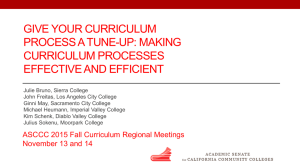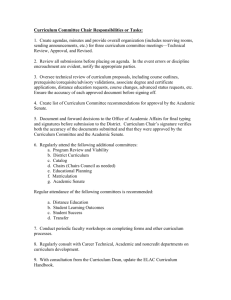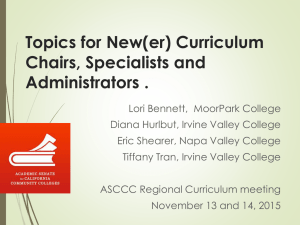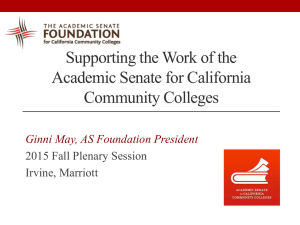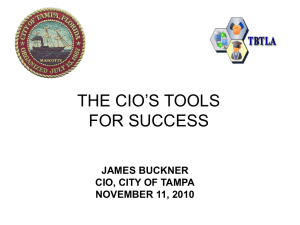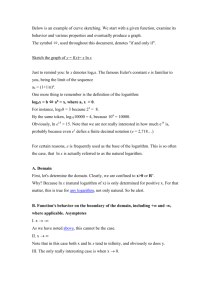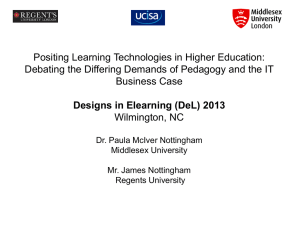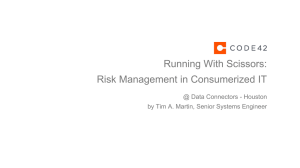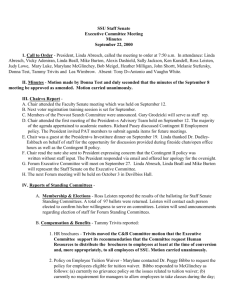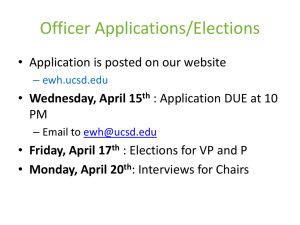Taking the Lead: Becoming a New Curriculum Chair
advertisement
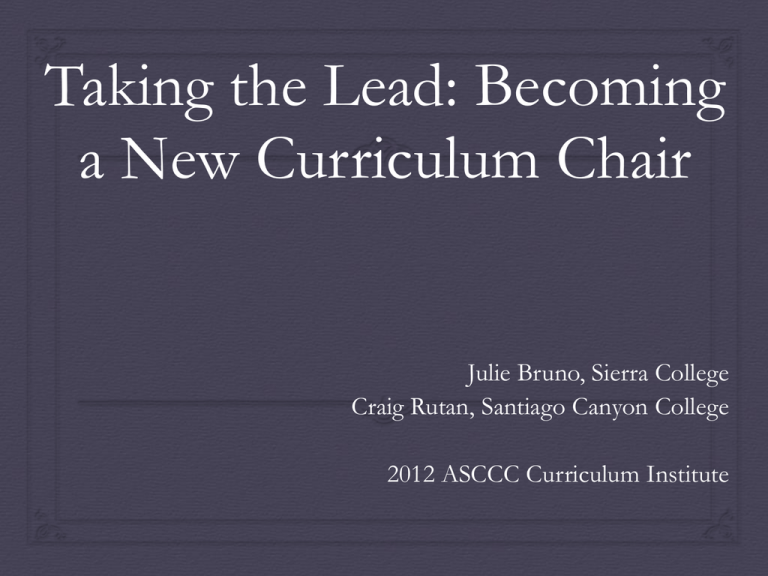
Taking the Lead: Becoming a New Curriculum Chair Julie Bruno, Sierra College Craig Rutan, Santiago Canyon College 2012 ASCCC Curriculum Institute Introductions Who are we? How many of you are new Curriculum Chairs? How many of you are new to the Curriculum Committee? Anything you REALLY want to be sure to get from this session? I just have to worry about CORs, right?? Being the Chair of the Curriculum Committee is one of the most important faculty leadership roles on a college campus. You are not only responsible for leading the Curriculum Committee but you are also an interface with your Academic Senate, CIO, the faculty, curriculum support staff, CCCCO, ASCCC, and your local governing board on all curricular issues affecting your college. The most important thing that you always need to remember is slow down and take a deep breath. What is your relationship to the CIO? What should it be? Working With Your CIO Schedule regular meetings with your CIO. Discuss important issues outside of the Curriculum Committee meetings. It is completely unproductive for the CIO and the Curriculum Chair to be disagreeing with each other during a committee meeting. This does not mean that you will always agree with your CIO or that they just get their way. Curriculum is a primary advice issue and belongs to the faculty. You need to develop a good working relationship with your CIO so that they will understand where you are coming from, when there is room for compromise, and when they will need to defer to the faculty. How is your relationship with curriculum support staff and the AO? You Can’t Survive Without Your Support Staff Strong support from the staff in your curriculum office is vital. Curriculum staff have many responsibilities including (but not limited to): submitting changes to CCCCO; inputting changes into your student enrollment system; prepare submissions for the governing board; and production of your college catalog. Establish an effective working relationship. How? Working With Your Articulation Officer Your Articulation Officer (AO) is an incredible resource of information for you and the curriculum committee. If they aren’t already a member of your committee, they probably should be. Role of the AO: Does your AO give reports at your meetings? How might you work with the AO to encourage faculty to make changes to their courses to improve your college’s articulation agreements? What should you consider when working with Faculty? Local Academic Senates Remember that the Curriculum Committee acts under the authority granted to the academic senate and they need to stay in the loop even if they are not actively reviewing all of the items approved by curriculum. Whether you are a voting member of your local academic senate or not, it is important that the Curriculum Chair attend all senate meetings. Explain upcoming issues that your local senate needs to be aware of. Working With Faculty Faculty tend to only look at their CORs when they are in curriculum review or want to create a new class. Educate the faculty on effective curriculum practice. Make yourself available to faculty to answer questions When regulatory changes happen (like repeatability), you need to sit down with affected faculty and explain what is going on and why. Technical Review Establish a strong technical review process for effectiveness. This committee can deal with looking at some of the things that tend to make CC meetings drag on-grammar, wording, codes, etc. Chaired by the Curriculum Chair or Vice-chair. Membership may include Curriculum Committee members. Will there be Conflict? Managing Conflict Get comfortable with conflict. Conflict can be productive or destructive, depending on how it is handled. Listen first. “Listen” to both the content and emotional component of a message and honor both. Often these conflicts have little to do with what is being discussed and is really about something else. No matter what this is happening, stay focused on the current issue. Managing Conflict (2) Remain impartial and remember that you are representing the faculty of your college not just one area. You can’t make everyone happy. Work with all parties to try and reach a solution that meets as many interests as possible. If conflicts happen during a meeting, take back the floor when the discussion gets off topic. Remember that you are in control of the meeting and you need to keep the discussion as civil as possible. Other considerations… Local Governing Board You might want to try attending local board meetings to get a feel for how your local board likes to operate. Remember that even though curriculum is a primary advice issue, the board may have questions about why the faculty have made certain decisions. When submitting curriculum items to the board for approval, be there in case the board has questions. If your board has many questions on a particular issue, volunteer to make a formal presentation to them. The more they respect you, the less likely they are to try and get involved with what you are doing. The Brown Act The Curriculum Committee is subject to the requirements of the Brown Act. All meetings must be open to anyone that wishes to attend. The public must be allowed to make comments. All items being voted on must be included on an agenda that is posted at least 72 hours prior to the meeting. Only a single reading is reading is required but many colleges have two readings. Action can only be taken on items listed for action. Items listed for discussion or from public comments can only be acted on after a motion has passed to suspend the rules. What now? Be Prepared Learn as much as you can about regulations and current issues at the state level. Review: Program and Course Approval Handbook (PCAH); COR: Curriculum Reference Guide; and Title 5. Adopt the phrase: “Let me get back to you on that.” Where do I go for help? http://www.ccccurriculum.info : FAQs, links to ASCCC papers and rostrum articles. http://www.cccco.edu : Chancellor’s Office website with many resources. Join the ASCCC Curriculum listserv. Join the Curriculum Chairs Yahoo Group. If you are not a member of this informal group, contact Joni Jordan at to join. Contact the current (or a former) ASCCC Curriculum Chair. Past curriculum chairs at your college or district. Summing Things Up Do your best and that is almost always enough. Gather information for as many sources as you can. The more you know, the better the choices you will make. If you can’t find an answer, contact others and see if they have one. Always keep your senate president in the loop. We are all in this together. Network at institutes and regional workshops so you can draw on the experience of others. Ask for help. Thank You for Coming! Do you have any questions for us? Presenter Contact Information: Julie Bruno: jbruno@sierracollege.edu Craig Rutan: rutan_craig@sccollege.edu
